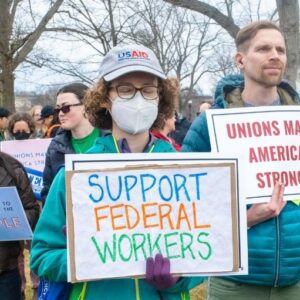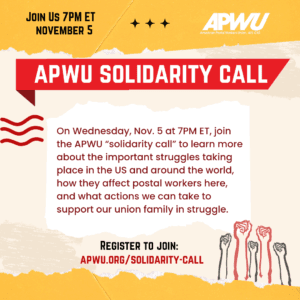May 1, 2017
Higher Union Membership Boosts Wages for All
(This article first appeared in the May-June 2017 issue of The American Postal Worker magazine.)
The correlation between a community’s percentage of union members and the average pay its workers make is crystal clear – the higher percentage of union members a city or state has, the higher the wages are for all workers, not only union members.
Unfortunately, many more states are poised to pass legislation designed to cripple workers’ rights. So-called “right-to-work” (RTW) laws continue to be introduced and passed in states around the country. Already in effect in 28 states, including three more in the last year (Kentucky, Missouri and West Virginia), the laws are designed to cut through the unified front workers present to management and weaken unions.

with community activists (L-R) Jeff Kramer, Kathy Staub, Keith Yergeau,
Elizabeth Ropp, Emily Eastman and Eric Zulaski after “right to work” law was defeated in NH.
RTW laws eliminate the ability for a workplace to be a “closed” union shop, and have employees pay union dues as a condition of employment. It also prohibits unions and employers from negotiating a “fair share” fee.
This fee ensures that employees benefiting from the gains and protections of a workplace collective bargaining agreement pay their part for the cost of negotiations. It requires that employees cover some of the cost of negotiating the collective bargaining agreement, any necessary contract enforcement and any union representation they may use when filing a grievance.
Without the requirement, unions are forced by law to spend resources representing non-members, at the expense of the dues-paying membership. As federal employees are already prohibited from having any union dues deducted automatically as a condition of employment, postal workers know all too well how freeloading weakens us all.
“So-called ‘right-to-work’ laws weaken unions in general,” said APWU Grassroots Legislative & Political Coordinator Janice Kelble. “Even non-members and non-union workplaces benefit from the work that unions do.”
Creates ‘Race to the Bottom’
In some states, such as Wisconsin, anti-worker laws go even further. Gov. Scott Walker’s 2011 legislation, 2011 Wisconsin Act 10, was written to stifle public employees’ rights in their workplace. Among other things, the law limits collective bargaining rights and caps wage increases with the Consumer Price Index (CPI). It also forces public employee unions to recertify every year, so the unions are forced to spend valuable resources combating anti-union communication and actions from management instead of representing their membership and strengthening the labor movement.
These laws create a ripple effect and a “race to the bottom” for the entire community.
“Without a good union job, I would not be able to support my local businesses,” Kelble explained. “There are so many things I wouldn’t be able to afford… When labor unions are weakened or busted at a workplace, the community has many more low paying jobs, creating a drain on everybody.”
Unified Victory
Earlier this year, community activists, including APWU members, stopped RTW in New Hampshire. APWU members participated with others against the legislation during public hearings and meetings.
“As a labor community, we were able to identify and mobilize supporters,” Kelble said. “Together we kept the pressure up, and, in some cases, persuaded legislators by holding district meetings in their communities.
“It was not just union people,” Kelble continued. “We had a coalition that included the faith community who joined us and were standing out there doing vigils against RTW, because they knew it’s bad for the entire state, not just for union workers.”



